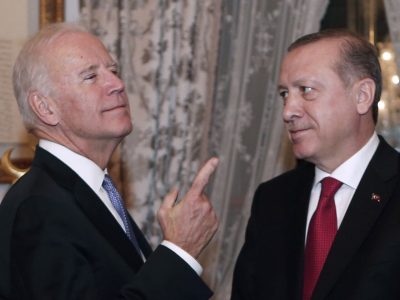Turkey Expected to Become US’ Largest Supplier of Artillery

All Global Research articles can be read in 51 languages by activating the Translate Website button below the author’s name (only available in desktop version).
To receive Global Research’s Daily Newsletter (selected articles), click here.
Click the share button above to email/forward this article to your friends and colleagues. Follow us on Instagram and Twitter and subscribe to our Telegram Channel. Feel free to repost and share widely Global Research articles.
Global Research Fundraising: Stop the Pentagon’s Ides of March
***
Turkey is set to become the United States’ largest supplier of artillery shells as NATO allies have exhausted their stocks and now struggle to ship ammunition to Ukraine. Turkey’s indirect support for Ukraine is also supplemented by direct support, such as producing drones and warships, yet Turkish President Recep Tayyip Erdogan offers himself as a viable partner in searching for peace between Ukraine and Russia.
“Turkish supplies of trinitrotoluene, known as TNT, and nitroguanidine, which is used as a propellant, would be crucial in the production of Nato-standard 155mm calibre ammunition — potentially tripling production, according to officials familiar with the discussions,” a Bloomberg report said, adding: “Turkey is already on track to becoming the biggest seller of the artillery shells to the US as early as this year.”
The surge in demand has delayed global orders and has put pressure on defence supply chains, especially for components such as TNT. According to the outlet, to help alleviate this issue, Turkish defence company Repkon’s production lines are expected to produce about 30% of all US-made 155mm artillery shells by 2025.
The Pentagon said in a statement about investment in Texas’ defence industry with Turkish counterparts that working with allies “is key to building a global defence industrial base.”
Additionally, Washington purchased 116,000 rounds of battle-ready ammunition from Turkish company Arca Defense, with delivery expected later this year and further purchases believed to be concluding soon to be ready for delivery in 2025.
As Bloomberg admitted,
“The US and European efforts are part of a race to catch up with Moscow, whose war machine has put it in a position to produce or procure – according to some estimates – 4 million rounds this year, including shipments from North Korea. By contrast, the European Union expects to triple its production of artillery shells this year to around 1.4 million units.”
It is unsurprising that Turkey has been awarded a lucrative contract, given the recent announcement that Erdogan will visit the White House on May 9, the first time since US President Joe Biden took office.
The agreement with Ankara also reveals a delicate balance between the NATO allies, whose relations have been strained by the Russian military operation in Ukraine and Turkey’s months-long block on Sweden’s membership in the Atlantic Alliance. However, with Turkey greenlighting Sweden’s accession and plans to contribute to Ukraine’s military-industrial complex, the country is now being rewarded with export contracts and approval to upgrade its aging F-16 fighter jet fleet.
The Turkish-made Bayraktar TB2 unmanned aerial vehicles (UAVs) have been used by the Ukrainian military against Russian forces. The drone maker, Baykar, has initiated the construction of a factory in Ukraine, and the company’s CEO said in February that they aim to complete the project within approximately 12 months and produce around 120 units a year.
At the same time, it is recalled that in February, France, Greece, and Cyprus blocked financing for the supply of Bayraktar drones and artillery shells for Ukraine, which were to be purchased with European funds. Turkey was set to be financed from EU funds for some time, but once the order was confirmed, the three countries swiftly blocked the financing.
Although the initiative failed, the US recognised Turkey’s rapprochement with the West and is now rewarding the country with imports and exports in the defence sector. This is despite the fact that the issue of the acquisition of the Russian-made S-400 is not resolved, which is the reason Turkey was booted from the F-35 fifth-generation fighter jet program to begin with.
Erdogan announced his offer to host a peace summit between Ukraine and Russia earlier this month following a meeting with his Ukrainian counterpart Volodymyr Zelensky.
“Since the beginning, we have contributed as much as we could toward ending the war through negotiations,” Erdogan said. “We are also ready to host a peace summit in which Russia will also be included.”
Although Erdogan claims to have contributed as much as possible to ending the war through negotiations, his country has also contributed to prolonging it. It is also recalled that during Zelensky’s visit to Turkey, he visited the shipyard where the two corvettes are being built for the Ukrainian Navy. At the same time, Turkey is providing drones to the Ukrainian military and is now replenishing the US’ artillery stocks. This is even though Ukraine has no chance of winning the war, meaning Turkey is not an honest broker for peace.
*
Note to readers: Please click the share button above. Follow us on Instagram and Twitter and subscribe to our Telegram Channel. Feel free to repost and share widely Global Research articles.
Ahmed Adel is a Cairo-based geopolitics and political economy researcher. He is a regular contributor to Global Research.
Featured image source

